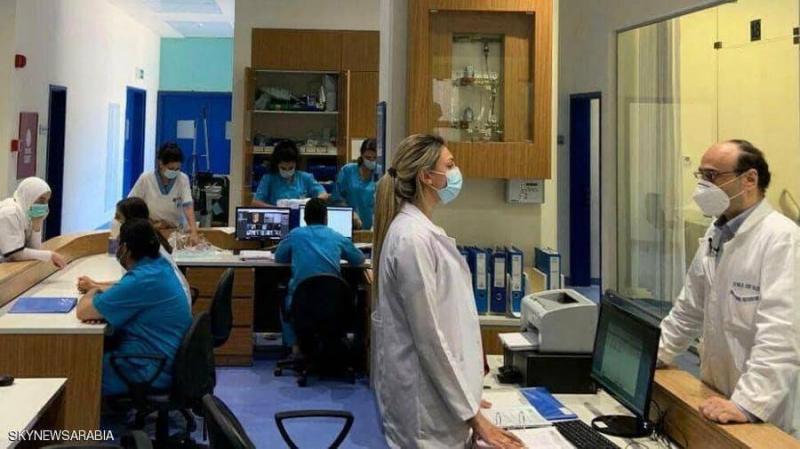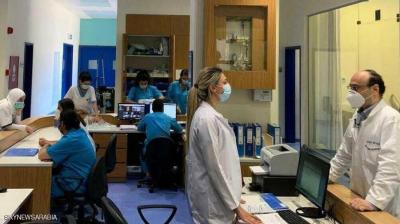As Lebanon's economic and financial sectors continue to collapse due to the liquidity crisis resulting from restrictions on cash withdrawals from banks, particularly concerning doctors' and hospital workers' salaries, and amidst rising living costs, the Hospitals Syndicate has come forth to highlight the dire situation and sound the alarm regarding the "health security" crisis they are facing. They warn of escalation if no positive solutions are reached.
Banks and the central bank are shifting blame to justify the reduction in withdrawal values, with some banks imposing fees or effectively creating a "haircut" on withdrawals even in Lebanese pounds. Banks argue that the central bank isn’t providing them with the liquidity they need in pounds, while the central bank has stated that banks can sell whatever amount of dollars they desire to obtain Lebanese pounds.
This measure, which some banks have begun to adopt, negatively impacts the salaries deposited in banks, limiting access for salary holders to withdraw their money at once, instead imposing monthly withdrawal caps based on the total accounts at the bank.
Furthermore, the President of the Hospitals Syndicate in Lebanon, Suleiman Haroun, explained to "Nidaa al-Watan" that "most banks have required hospital owners to deposit salary amounts in cash at the bank, in full or in part, to pay their employees," refusing to transfer money from hospital accounts to employee accounts. Regarding the direct payment of salaries to employees instead of depositing them in banks, Haroun stated that "the issue is not here but in the liquidity crisis we are facing, as most dues owed to hospitals are now being paid in cash — starting with fuel, medicines, and medical supplies, and even food, all of which are paid for in cash due to the rejection of checks as a means of payment."
The refusal of banks to accept the transfer of funds from guarantors into hospital owners’ accounts to pay salaries, which are dues owed to hospitals from the Ministry of Finance, the National Social Security Fund, or insurance companies, has only added fuel to the fire.
Regarding withdrawals, if hospital owners attempt to withdraw transferred funds into their accounts, a 35% deduction is made from the amounts withdrawn in Lebanese pounds. Haroun provided an example where if a hospital management decides to withdraw around 100 million Lebanese pounds from the bank, 35 million pounds would be deducted, resulting in a remaining 65 million Lebanese pounds.
In this current state, hospital employees receive their salaries in parts: a portion from the bank and a portion in cash in dollars from the hospital. Amid this confusion, Haroun clarified that hospitals capable of paying salaries in cash have started depositing cash in banks to pay employees, while those unable to do so are facing employees not receiving their full salaries at the end of the month.
Regarding the actions the Hospitals Syndicate will take if the week-long deadline they set for the government to resolve their crisis passes, the syndicate will escalate by declaring a strike. Previously, the doctors' syndicate also threatened to escalate their actions, with the President of the Beirut Medical Association, Professor Sharaf Abu Sharaf, warning in a statement about the continuation of banks imposing illegal restrictions on the financial accounts of doctors and medical committees in hospitals, setting impossible conditions on their accounts, and deducting a high percentage from the transfers they receive from official and private guarantors. He stated, "This arbitrary treatment will force the Medical Syndicate to take escalation steps," warning of the serious risk of continued bleeding in the medical sector outside the country.
As for hospital insurance policies, it has become known that payments are now exclusively in cash dollars starting in October. Free professions syndicates, like the Engineers Syndicate, no longer adhere to differences in guarantees, with insurance coverage being 100% without guarantee differences; thus, the insured must pay their insurance contributions in full without difference. An engineer and his family are calculated in Lebanese pounds based on fresh dollars, while family members under their coverage pay in cash dollars.
To facilitate dealings with patients, newly issued insurance cards now bear the term "fresh" for those paying in cash dollars. The same applies to patients entering hospitals, where an added designation is marked on the wristband around the patient: "fresh", "check", or "Lebanese", determining how the patient will be treated and tested.
In this context, the amount that a patient must provide upon entering the hospital is established based on their classification. Haroun explains that holders of "fresh dollar" policies do not pay any differences, and they are essentially covered 100%. However, older policies renewed before November, before enforcing the exclusive payment of "fresh", remain valid, but the insured must pay 15% of the hospital bill issued in fresh dollars if the insurance company agrees to settle the bill in check dollars.
The 3,900 Lebanese pound policies require a 15% payment from the insured if the insurance company agrees to cover their bill with check dollars.
For his part, the Chairman of the Board of the "Mashrek" Insurance Company, Deputy Alexander Matousian, confirmed that "there is no payment in Lebanese pounds in the medical field; either the insurance premiums are paid in check dollars or in cash." He clarified that "Mashrek" relies on the following options: either the insured pays the entire insurance premium in check dollars, which then entails additional payments in hospitalization cases, or a "half cash" and half check dollar arrangement, where there are no payments required at the hospital or payment can be made in cash dollars, making the insurance premium lower in exchange for full coverage without obligating the patient for any additional payments.
The problems are multiplying and expanding, paving the way for complete chaos across all economic sectors, especially in health and medical services, unless parliamentary elections take place, issues of reforms and restructuring of the banking sector are addressed, the budget is approved, the electricity plan is initiated, and the exchange rate of the dollar is unified. These are key demands from the International Monetary Fund, announced in a statement yesterday, which indicated a mutual agreement with Lebanon under which 3 billion dollars will be provided over four years in installments based on the government's progress regarding reforms.
Patients entering hospitals will be classified as follows: "fresh" (no additional payments), "check" (15% payment on the dollar bill), or Lebanese (3,900 pound policy where the patient is obligated to pay 15% of the bill if the insurance company agrees to cover it in check dollars).




